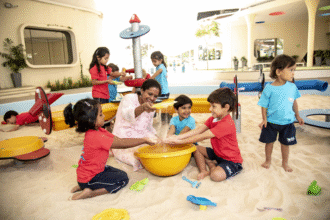Starting daycare is a big step for both toddlers and parents. For your child, it may be the first time they’re away from you for an extended period. For you, it may be the first time you entrust someone else with their care. It’s natural to feel a mix of excitement and nervousness—but with a little preparation, the transition can be smooth and even enjoyable.
Here’s a step-by-step, gentle guide to help you prepare your toddler for their first daycare experience.
1. Start with a Positive Mindset
Children can pick up on your feelings, especially anxiety. The best way to start preparing your toddler is to stay calm and enthusiastic about the upcoming change. Instead of saying “I’m going to miss you so much,” say something like, “You’re going to have so much fun and make new friends!” This sets a positive tone and helps your child feel excited rather than scared.
2. Visit the Daycare Together
Before the big first day, arrange a visit to the daycare center with your child. Let them explore the space, meet the teachers, and play with some toys. Being in the environment ahead of time helps reduce fear of the unknown. Try to visit at least once or twice to help them get used to the space.
Tip: If the daycare allows it, try a short stay or trial day where you leave your toddler for just an hour or two. This helps them ease into the full-day routine.
3. Talk About Daycare Regularly
Start talking about daycare in simple, happy language. Use stories or picture books about kids going to daycare to help them understand what to expect. You could say things like:
- “At daycare, you’ll play with toys and sing songs.”
- “You’ll eat yummy snacks and play outside.”
This builds a sense of familiarity and helps create positive associations.
4. Establish a Routine at Home
Toddlers thrive on routine, and daycare schedules are usually very structured. Begin shifting your home routine to match the daycare’s rhythm. Practice waking up at the same time, getting dressed, having breakfast, and saying goodbye.
Example: If daycare starts at 9 AM, try to start your morning routine around 7:30 or 8 AM to avoid feeling rushed.
5. Practice Short Separations
If your child has not spent much time away from you, start by practicing short periods apart. Leave them with a trusted friend, grandparent, or babysitter. Let them know you’ll be back soon—and always follow through. These little moments help build trust and reduce anxiety when the real goodbye happens.
6. Let Them Take a Comfort Item
Most daycare centers allow toddlers to bring a familiar item like a stuffed animal, small blanket, or photo from home. This “comfort item” can help them feel safe and connected to you during the day.
7. Teach Simple Self-Help Skills
While your toddler doesn’t need to be fully independent, practicing a few simple skills can help boost their confidence. Encourage them to:
- Wash their hands
- Put on their shoes
- Feed themselves
- Say words like “help,” “bathroom,” or “done”
These small steps promote independence and make daycare life easier for everyone.
8. Label Everything
Be sure to label all your child’s belongings—clothes, lunchbox, bottles, bags—with their name. This helps the daycare staff keep track of everything and avoid mix-ups.
9. Talk to the Teachers
Communicate openly with your child’s caregivers. Share important details like:
- Your child’s allergies or medical needs
- Their likes and dislikes
- Nap routines or comfort techniques
The more they know about your toddler, the better they can care for them and make the transition smoother.
10. Be Prepared for Mixed Emotions
The first few days (or even weeks) might come with tears—yours or your child’s. This is completely normal. Some toddlers may cry at drop-off but calm down quickly after you leave.
Stay calm, keep goodbyes short, and create a loving goodbye ritual like:
- A kiss on both cheeks
- A secret handshake
- Saying, “I’ll be back after snack time!”
These routines help toddlers feel safe and know what to expect.
11. Celebrate the Milestones
Celebrate your toddler’s new adventure! After their first day, talk about all the fun things they did. Say things like:
- “I’m so proud of you!”
- “You’re getting so big and brave!”
Maybe even plan a small treat—like a favorite snack or extra bedtime story—to reward them for being so courageous.
12. Be Patient and Flexible
Every child adjusts at their own pace. Some love daycare from day one. Others take a little longer. Be patient, offer extra cuddles, and give them time to adjust. Trust that with consistency, it will get easier.
Final Thoughts
Starting daycare is a big milestone, but it doesn’t have to be scary. With a little planning, patience, and love, you can help your toddler feel confident, secure, and excited about this new chapter.
Remember, you’re not just sending them off—you’re helping them grow, learn, and thrive in a new environment. And that’s something to be proud of.
5 Frequently Asked Questions (FAQs)
1. How long does it take for a toddler to adjust to daycare?
Every child is different. Some may adjust in a few days, while others may take several weeks. Consistency, communication, and reassurance at home help make the transition smoother.
2. What should I pack for my toddler’s first day of daycare?
You should include:
- Extra clothes
- Diapers/wipes (if needed)
- Snack/lunch
- Nap blanket
- Comfort item
- Bottles/sippy cups
- Any medication with instructions
Be sure everything is labeled!
3. Is it normal for toddlers to cry at drop-off?
Yes! Many toddlers cry at drop-off during the first few days or weeks. It’s a natural response to separation anxiety. Most children calm down quickly once you leave and get involved in activities.
4. What if my toddler refuses to eat or nap at daycare?
It’s common for children to struggle with eating or napping in a new environment. Over time, they usually adjust as they become more comfortable with the routine and caregivers. Talk to the daycare staff for tips and feedback.
5. How can I stay connected during the day?
Many daycares offer photo updates or apps that show your child’s activities. If not, you can ask the teachers for daily reports. Talking about your child’s day afterward also strengthens your connection and helps them feel seen.






